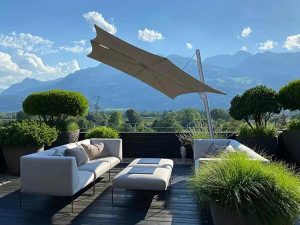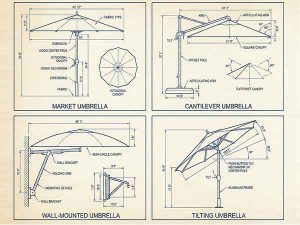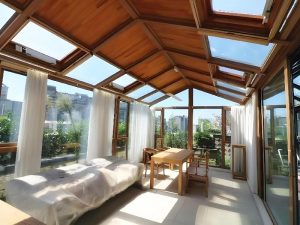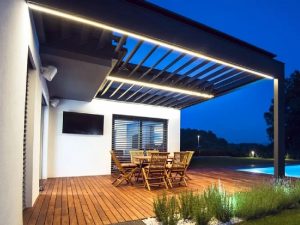With advancements in material technology, many modern gazebos no longer use traditional materials like wood. Instead, they are now made from durable materials like steel and aluminum. If you are looking for a modern metal gazebo for your backyard, you might wonder: is steel better, or is aluminum the right choice? As a professional Chinese gazebo manufacturer, LIDA OUTDOOR is here to help you compare these two materials from various angles and make an informed decision.
Quick Decision: Steel or Aluminum Gazebo?
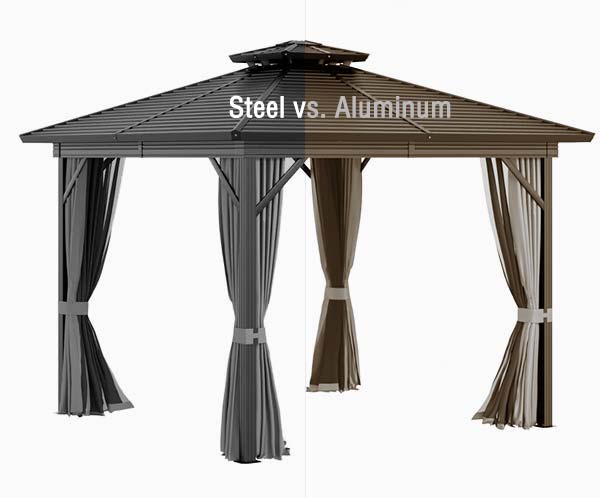
We’ve created a simple comparison table based on material properties, durability, cost-effectiveness, ease of installation, appearance, and maintenance. This will help you quickly understand the pros and cons of steel, galvanized steel, and aluminum gazebos, allowing you to make a fast and informed choice.
| Comparison Dimension | Steel/Galvanized Steel Gazebo | Aluminum Gazebo |
| Material Properties | Strong, prone to rust, requires galvanization for corrosion resistance | Lightweight, highly corrosion-resistant, moderate strength |
| Durability | High strength, withstands extreme weather, requires regular maintenance | Corrosion-resistant, suitable for most weather conditions, nearly maintenance-free |
| Cost-Effectiveness | Lower cost, great value, but requires regular upkeep | Higher cost but low maintenance, long-term value |
| Ease of Installation | Heavier, more complex to install, requires professional help | Lightweight, easy to install, great for DIY enthusiasts |
| Usage Scenarios | Suitable for extreme weather, such as strong winds and heavy snow | Best for mild weather areas, easy to move |
| Appearance | The metallic look fits many styles | Flexible design options can even mimic wood grain |
| Maintenance | Requires rust-proof coating once or twice a year | Almost no maintenance is required |
A steel gazebo is a good choice if you’re looking for a more spacious and sturdy option within a limited budget. However, if your budget allows, and you want better corrosion resistance, a galvanized steel gazebo is a step up from regular steel. On the other hand, if you prefer something lightweight, easy to install, and live in a mild or coastal climate, an aluminum gazebo is your best bet.
Comparison 1: Craftsmanship and Material Properties
Steel is primarily made through the steel-making process, resulting in carbon or alloy steel, known for its high strength, hardness, and plasticity. However, steel has a clear disadvantage – it easily oxidizes, rusts, and corrodes. To improve steel’s corrosion resistance, manufacturers often opt for galvanized steel when producing gazebos.
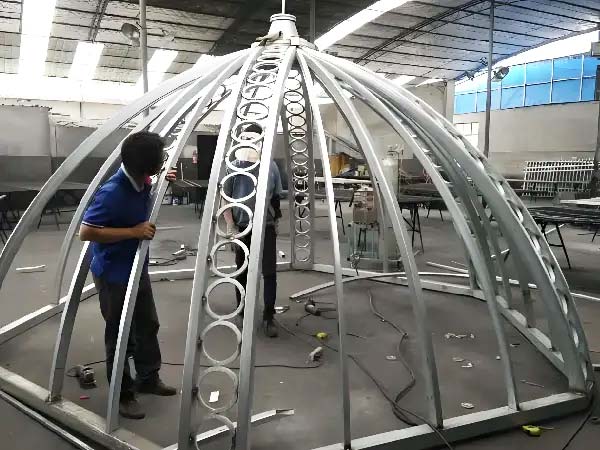
Galvanized steel is treated using two main processes: hot-dip galvanization and electro-galvanization.
Hot-dip galvanization involves dipping steel into molten zinc, forming a zinc-iron alloy layer, while electro-galvanization coats the steel surface with a uniform, dense layer of zinc using electrolysis. Both methods effectively improve corrosion resistance. The zinc coating also provides cathodic protection, extending the material’s lifespan. Besides retaining steel’s natural strength, galvanized steel enhances mechanical properties like tensile strength and yield strength.
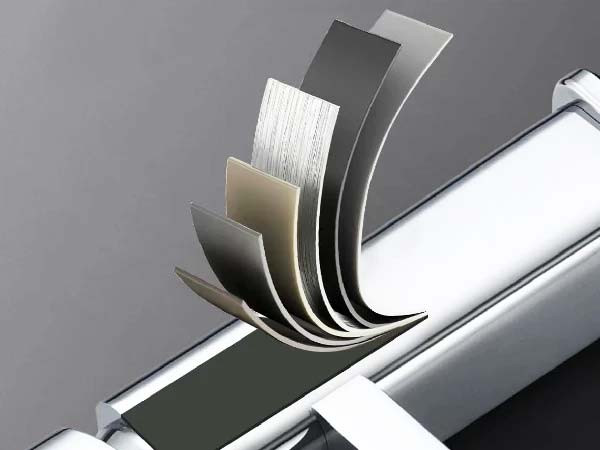
Aluminum, on the other hand, is known for being lightweight yet strong. Its surface forms a stable oxide layer that provides excellent corrosion resistance. Aluminum used in gazebos is often aluminum alloy, which includes elements like copper, magnesium, zinc, and silicon to enhance strength and plasticity. Aluminum alloys are not only corrosion-resistant and tough, but they are also easy to polish and paint, achieving a great surface finish.
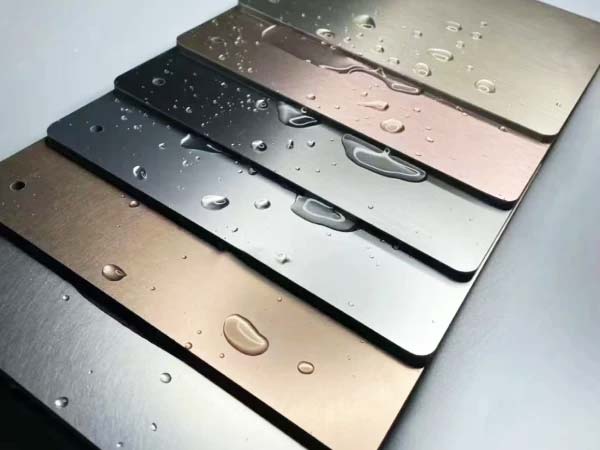
Comparison 2: Durability
Steel is renowned for its high strength, making it an excellent choice for withstanding harsh weather conditions such as strong winds and heavy snow. Compared to regular steel, galvanized steel benefits from an additional protective coating, improving its corrosion resistance and enhancing its durability. However, galvanized steel is not invincible. If the coating gets damaged and the steel is exposed to moisture or corrosive environments, such as salty air, it may still rust, affecting the lifespan of the gazebo.
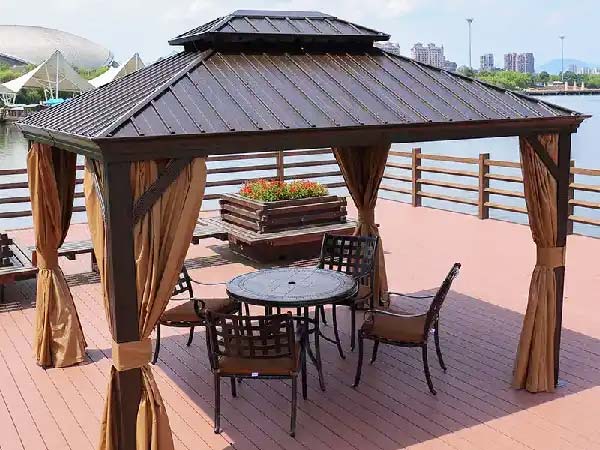
Aluminum, though not as strong as steel, provides sufficient durability in regions without extreme weather conditions. High-quality aluminum gazebos are typically designed to withstand winds up to 7 on the Beaufort scale, as well as heavy rain, making them a reliable choice for most weather conditions.
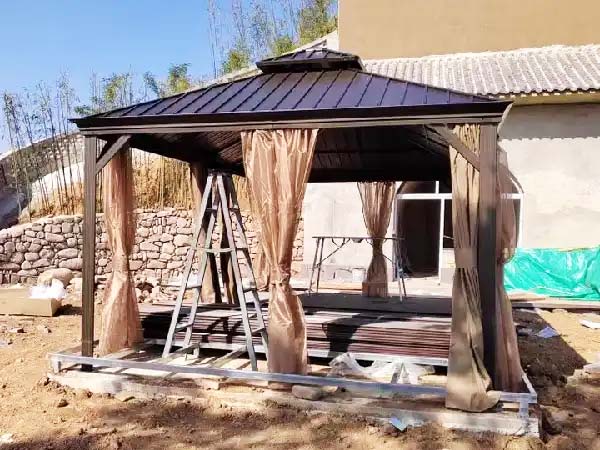
Comparison 3: Cost-Effectiveness
Overall, steel gazebos tend to be more affordable than aluminum gazebos for gazebos of the same style and size. This is because the raw material cost and energy consumption during aluminum production are higher than steel production. While aluminum alloy gazebos are more expensive, they are lightweight, durable, and highly resistant to rust and corrosion. Of course, the cost can also be affected by the complexity of the design and manufacturing process.
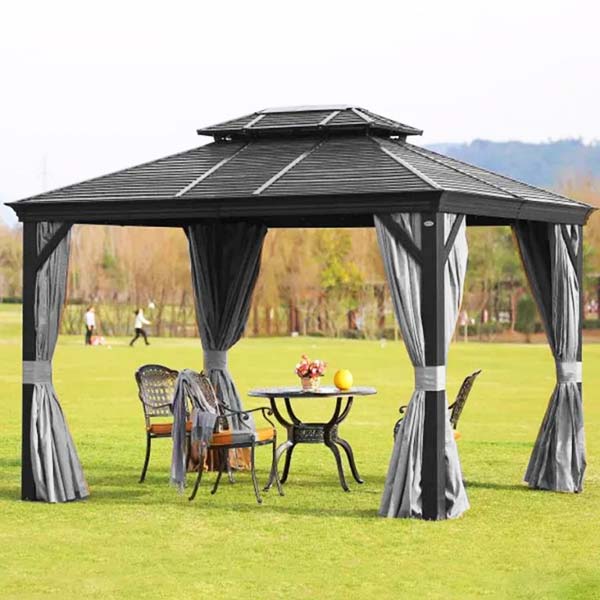
If you have a sufficient budget and want a product that requires little to no maintenance, we recommend choosing an aluminum gazebo. Its superior performance makes it worth the investment, with almost no maintenance needed. However, a steel gazebo is still a great option if you’re working with a tighter budget. Although it requires more care to prevent rust, its durability is still impressive. Regular maintenance, such as applying rust-resistant coatings annually, can significantly extend its lifespan. And don’t worry. The maintenance tasks are straightforward, ensuring long-term usability.
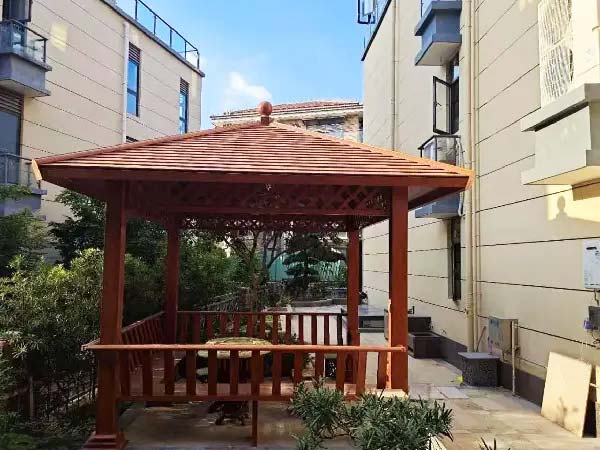
Comparison 4: Ease of Installation
Whether made from regular steel or galvanized steel, steel gazebos are much heavier than their aluminum counterparts. Therefore, you might need extra hands and specialized tools during installation. Due to their weight and complexity, steel gazebos are generally more suited for professional installation, which makes DIY installation more difficult.
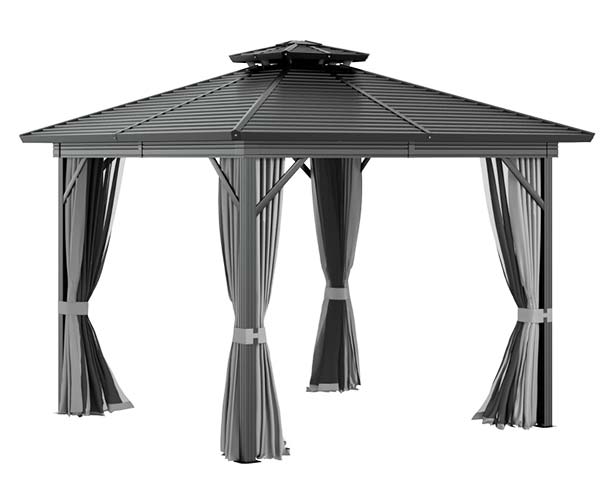
On the other hand, aluminum gazebos are much lighter and easier to install. If you’re a DIY enthusiast, an aluminum gazebo might be the better choice. In fact, depending on the size, you could set it up on your own without needing much extra help or advanced tools.
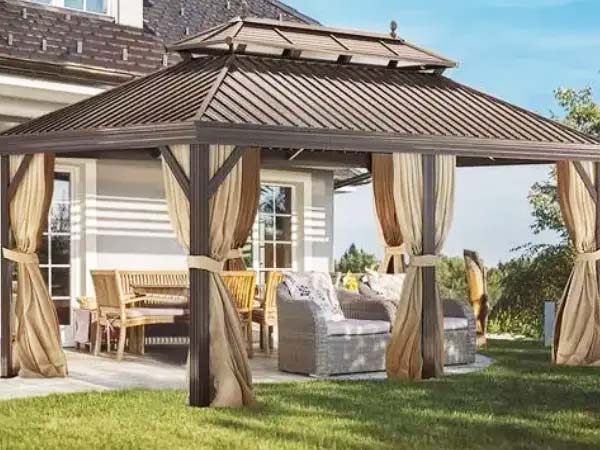
Comparison 5: Usage Scenarios
If you live by the coast or in a tropical, rainy region, we recommend choosing an aluminum gazebo because of its excellent corrosion resistance. Aluminum handles humidity and salty environments much better than steel. Additionally, if your area has mild weather without extreme conditions, an aluminum gazebo is a great option, especially if you prefer a gazebo that’s easy to move around. Aluminum’s lightweight design makes it easier to relocate or disassemble when needed.
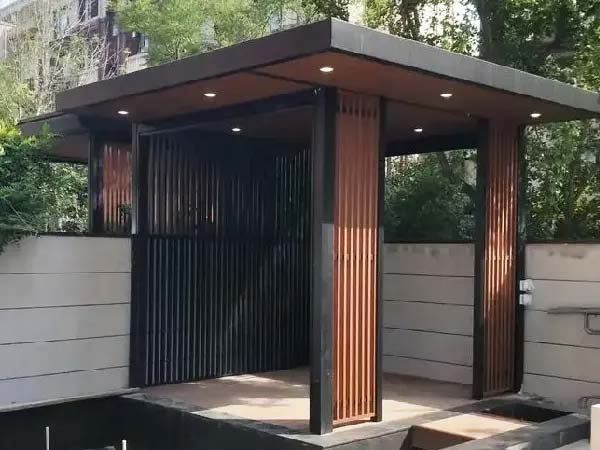
However, a steel gazebo would be more suitable if you live in an area prone to extreme weather conditions like high winds or heavy snowfall. Its high strength makes it more stable and reliable in harsh weather, providing better protection against the elements.
Comparison 6: Appearance and Design
If you prefer a metallic finish for your gazebo, both steel and galvanized steel gazebos can meet your aesthetic needs. Whether you lean towards a traditional or minimalist design, modern manufacturing techniques can accommodate various styles for both materials.
One significant advantage of aluminum gazebos is their design flexibility. Some manufacturers can even produce aluminum gazebos with a wood-grain effect, making the gazebo look like wood but with the durability of aluminum. In terms of design and appearance, both steel and aluminum can cater to most users’ needs, and they also offer different surface treatments and styles to suit individual preferences.

Comparison 7: Maintenance
As mentioned earlier, aluminum outperforms steel in rust and corrosion resistance. If you prefer a low-maintenance option, an aluminum gazebo is an excellent choice because it requires almost no upkeep.
In contrast, steel gazebos do require some routine maintenance. Every year, you must apply or spray an anti-rust coating or paint on the surface to prevent rust and corrosion. This simple task not only extends the gazebo’s lifespan but also keeps it looking great. So, if you don’t mind spending a little time on maintenance, a steel gazebo can still be a solid choice.
Conclusion
In summary, both steel and aluminum gazebos have their unique advantages. Steel gazebos offer high strength and stability, making them ideal for extreme weather, but they require regular maintenance. Aluminum gazebos, on the other hand, are lightweight, corrosion-resistant, and low-maintenance, making them perfect for regions with mild climates and for those who prefer easy installation. If you have the budget and want a hassle-free experience, an aluminum gazebo is your best option. However, if cost-effectiveness is a priority, a steel gazebo can meet your needs with proper care and maintenance.
No matter which option you choose, LIDA OUTDOOR offers high-quality gazebos to help you create the backyard of your dreams. Wholesale gazebo distributors can contact us for bulk orders of modern, high-quality sunshade products.

